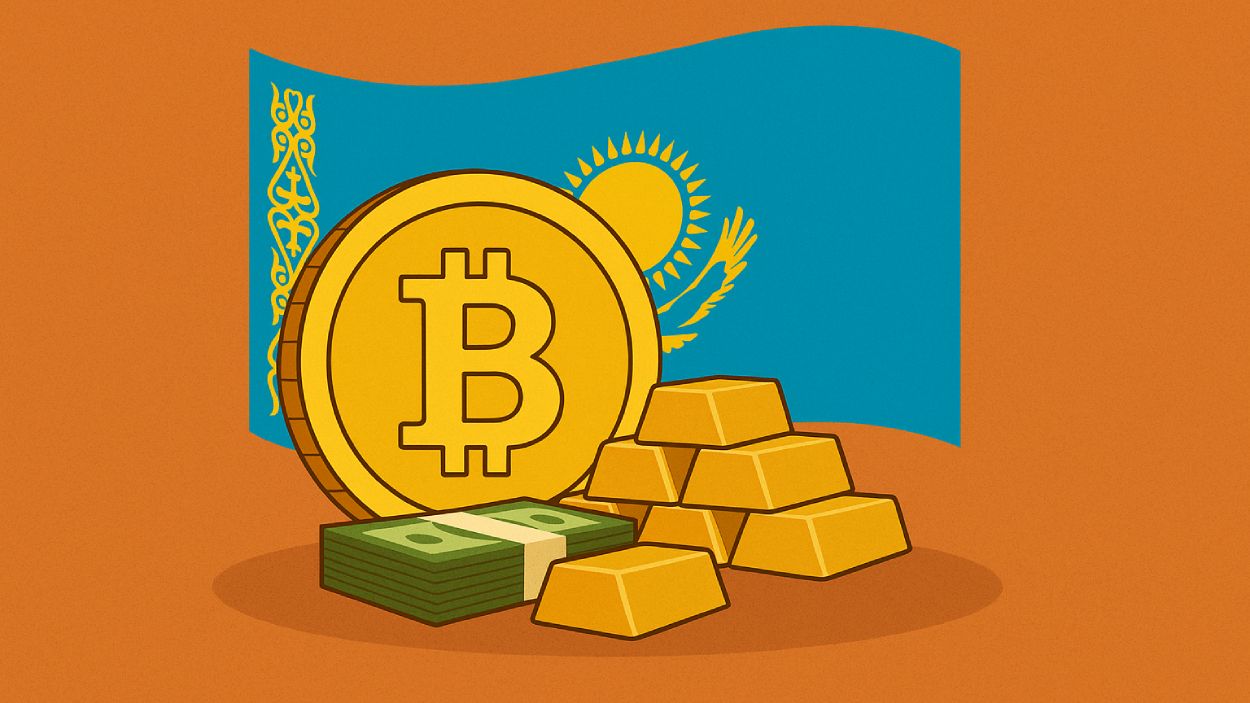Kazakhstan is gearing up to launch a state-managed crypto reserve fund, aiming to diversify its economy and reduce dependence on fossil fuels.
Quick Summary – TLDR:
- Kazakhstan plans to establish a crypto reserve fund worth $500 million to $1 billion by early 2026.
- The fund will be fueled by seized assets, gold, and foreign currency reserves.
- Rather than direct crypto holdings, the fund will invest in crypto-focused ETFs and digital finance companies.
- The move is part of a broader push to shift from oil reliance to becoming a regional fintech and blockchain hub.
What Happened?
Kazakhstan is preparing to set up a sovereign crypto reserve fund worth up to $1 billion, leveraging confiscated digital assets, national reserves, and proceeds from state-linked crypto operations. The initiative was announced by Berik Sholpankulov, deputy chairman of the National Bank, during a recent parliamentary session. The government expects the fund to be operational by early 2026.
JUST IN: 🇰🇿 Kazakhstan to launch $1,000,000,000 crypto reserve fund using seized assets by 2026 – Bloomberg. pic.twitter.com/dOjQYaNg77
— Whale Insider (@WhaleInsider) November 7, 2025
Kazakhstan’s Digital Pivot Gains Momentum
Kazakhstan is reimagining how it manages national wealth. For decades, the country has relied heavily on oil exports and natural resources. But now, amid shifting global energy dynamics, the government is steering its strategy toward blockchain and digital finance.
Sholpankulov confirmed that the country is exploring the use of gold and foreign exchange reserves to help build the crypto fund. The fund will not hold cryptocurrencies like Bitcoin directly. Instead, it will focus on more regulated instruments such as:
- Exchange-Traded Funds (ETFs) with crypto exposure.
- Companies in the blockchain and digital finance sectors.
This structure mirrors the approach used by major institutional investors and sovereign wealth funds around the world, aiming to manage risk while benefiting from the upside of digital assets.
Seized Assets Fueling the Fund
A key component of Kazakhstan’s strategy involves seized or repatriated digital assets. These include:
- Confiscated wallets and tokens from shut-down operations.
- Proceeds from state-run mining ventures.
- Digital assets recovered from anti-money laundering crackdowns.
According to Bloomberg, $16.7 million in crypto was seized in recent enforcement actions. These assets will be transferred to a state digital asset fund to act as a strategic reserve.
The Astana International Financial Centre (AIFC), Kazakhstan’s main hub for fintech and blockchain, is expected to play a central role in managing the new fund. Government sources also hinted that foreign partners could be involved in the project once it becomes fully operational.
Policy Backing and Broader Ecosystem Goals
President Kassym-Jomart Tokayev has been vocal about building a “full-fledged ecosystem of digital assets” in Kazakhstan. His administration has accelerated efforts to regulate and integrate crypto technologies into the national economy.
Recent developments include:
- A stablecoin project developed in collaboration with Solana and Mastercard.
- A central bank digital currency (CBDC) pilot.
- Strategic partnerships with global crypto platforms like Binance, which helped launch a state-backed crypto reserve using BNB as the first digital asset.
SQ Magazine Takeaway
I love what Kazakhstan is doing here. They’re not just dipping a toe in. They’re going in with a serious, billion-dollar commitment. This isn’t about trendy Bitcoin plays or quick wins. It’s a deliberate, structured pivot toward long-term financial innovation. Using seized assets to fund this? Brilliant. That’s money already out of circulation now being repurposed for economic development. If they pull it off, Kazakhstan could become Central Asia’s fintech capital. This move speaks volumes about how digital assets are evolving from speculative tools to strategic national resources.


































































